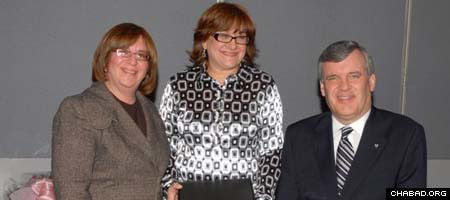Toronto's local Jewish federation singled out the Friendship Circle, a Chabad-Lubavitch organization that partners teenage volunteers with children with special needs, for its work making sure that children of all abilities participate in communal activities.
Some 150 people attended the Feb. 26 ceremony awarding the local Friendship Circle and three other organizations the UJA Federation of Greater Toronto's Inclusion Initiative Award. The federation fielded some 21 nominations for the honor, which was awarded based on groups' demonstrated impact, innovation and sustainability in inclusion in their work with the special needs community.
"The UJA is dedicated to bring the importance of physical and social inclusion to the attention of the Jewish community," said Stanley Kugelmass, chair of the federation's inclusion initiative. "We laud the individuals and organizations that have accomplished this [inclusion] and have made inroads in this matter, and we are committed to further this endeavor."
For the five-year-old Friendship Circle, the award marks greater communal sensitivity to those with special needs.
"The more people become aware, the better opportunities will be for people with special needs," said Esther Grossbaum, the co-director of Chabad-Lubavitch of Toronto who founded the local Friendship Circle with Chaya Perman.
In Toronto, the Friendship Circle – part of an international network based in West Bloomfield, Mich. – has volunteers serve as mentors to children with special needs. Through weekly home visits and a Sunday Circle group activity, the children and volunteers develop meaningful bonds.
When the program began, some 35 children and 60 volunteers participated. Today, 90 children and 125 volunteers take part in the Friendship Circle, which offers programming for infants and young adults up to age 23, in addition to its core group of children aged 3-14.
The Friendship Circle "really speaks to the inclusion of kids with special needs into the community," said Fay Rotman, director of the federation's inclusion initiative.
"The program makes it so that children have a friend, and their loneliness is accommodated," said Grossbaum. "This has an effect on the volunteers as well, who become very sensitive and caring to children with special needs."
In her acceptance speech, Perlman mentioned teachings of the Rebbe, Rabbi Menachem Mendel Schneerson, of righteous memory, emphasizing the unique spiritual quality of children with special needs, and the necessity of providing tangible opportunities to perform mitzvahs.
"Although the Rebbe's words were written many years ago, we need to hear them now [and] allow them to serve as a catalyst to further our efforts," said Perlman. "We will not sit back on our laurels, but will continue with vigor to strengthen and enhance our program."









Start a Discussion